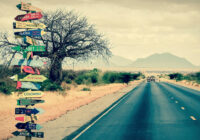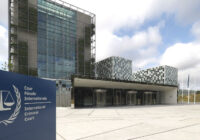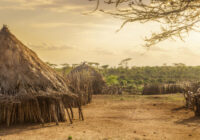Elections, free, fair and not-so-fair, at a time of economic crisis mark a deepening of democracy in a continent where Big Men once ruled with impunity.
Power abhors a vacuum. In many parts of Africa, independence from European imperial powers was just a ceremonial transfer of power to local autocrats. When the imperialists hurriedly packed their belongings and marched off, “Big Men” took over and dispensed with niceties such as elections.
As the authors explained in the previous edition of Africa This Month, Africans chose neither the states they live in nor their borders. Disparate peoples were forced to coexist in rigidly defined sovereign states with centralized power structures that encouraged despotism, patronage and struggle for power. The African Big Man emerged as a de facto all-powerful king in a land that had thitherto known smaller homogenous kingdoms or chiefs and council of elders. In a twist of irony, many pre-colonial traditional African regions espoused inclusive democratic values that were further eroded by the emergence of the Big Men.
This month, many elections took place in Africa. All of them were rambunctious affairs. Some had messy outcomes but they point to a new future for a continent where the true will of the people—the women and men at the grassroots—is finally beginning to matter.
South Africa: The Beginning of the End of an Era
The country of Nelson Mandela made history this month. The ruling African National Congress (ANC), once Mandela’s party, lost to the opposition Democratic Alliance (DA) in local polls in the administrative capital, Pretoria. The DA also won the Nelson Mandela Bay municipality, which has a rich history of anti-apartheid struggle. The ANC even lost Johannesburg, marking what the BBC called “a tectonic shift in South African politics.”
Although the ANC still won 54% of the national vote, its electoral performance was the worst since the end of apartheid in 1994. Mandela is probably smiling in his grave as democracy takes root in his country. A democrat at heart, he would be glad to see South Africans shed off racial and tribal dispositions, and vote on the issues. Such was the magnanimity of the man that he would sooner see this ideal triumph at the expense of his beloved ANC.
With housing inadequate, unemployment at 26.6%, education poor, water scarce, electricity irregular and garbage strewn in the streets, people lost patience with the corruption scandals and routine incompetence of the Jacob Zuma-led ANC.
South Africa has suffered deeply from the global economic downturn. As demand for commodities has plummeted, earnings and jobs have been in short supply. The ANC is certainly not responsible for the downturn but it has demonstrated a lack of leadership at a time of crisis. In the March and April editions of Africa This Month, the authors chronicled some of the scandals of President Jacob Zuma that have cast a gloomy cloud over the country.
The “Guptagate” scandal hurt the South African economy at the very time it needed a steady hand on the tiller. Zuma arbitrarily sacked Nhlanhla Nene, his capable finance minister, and appointed an upstart instead who barely lasted two weeks into the job. Rumors swirled in South Africa about the wealthy Gupta family wielding undue influence over Zuma, and the deputy finance minister alleged that the family had offered him Nene’s position. This incident shook investor confidence in the economy and the ANC’s reputation was dragged into the mud along with Zuma’s.
Scandals have continued to plague Zuma and the ANC even as the economy and people suffer. In the land of apartheid, many black South Africans have voted for the once white-dominated DA. In 2014, when the DA elected a black leader, Mmusi Maimane, the ANC ridiculed him as a stooge. Given South Africa’s history, this was a powerful and emotive label. Yet despite the historic appeal of the ANC, black South Africans voted for the DA in the hope it will do a better job in providing services to the people than the ANC.
Clearly, there has been what the BBC calls a “paradigm shift in South Africa’s politics — voters are now more interested in issues rather than race.”
A Fishy Election in Gabon
Despite the ANC being shell-shocked at the outcome of the polls—a pyrrhic victory—South Africa’s elections went off rather smoothly. In West Africa, Gabon’s presidential election was not as smooth; a contest made even more problematic by the fact that it ended up becoming quite a close-run thing. Election authorities declared that President Ali Bongo had garnered 49.8% of the vote, while opposition leader Jean Ping had received 48.2%. Bongo beat Ping by a mere 5,594 votes; the closest presidential election in Gabon’s history.
Bongo came to power in 2009 after a contested election. In the aftermath of that election, the opposition alleged fraud. Their supporters took to the streets and torched the French consulate general. Bongo’s troops crushed the protests with an iron fist, paving way for him to “ascend to the throne” upon the death of his father, Omar Bongo, who was Africa’s longest-serving leader when he died in 2009. He was often described as the last of Africa’s Big Men and the world’s longest serving non-monarch.
Omar Bongo rose to power through the colonial military. He was the first black man to serve in the French Air Force in Chad and French paratroopers once saved his bacon. As a member of the minority Bateke ethnic group, Bongo ruled cannily and outlasted most of his fellow leaders. Corruption and violence were par for the course, though, and the Bongo family amassed a personal fortune from the country’s oil boom.
Ping was once an ally of Omar Bongo and has two children with his daughter. He is the son of a Chinese merchant who emigrated from Wenzhou and holds a doctorate in economics from the University of Paris I (Panthéon-Sorbonne). From 2008 to 2012, Ping served as the chairperson of the African Union Commission (AUC) and is a rather well-known international figure.
Ping poignantly points out that voter turnout in Ali Bongo’s home province of Haut-Ogooue was 99.9% and Bongo got 95.5% of votes, while voter turnout in other provinces was between 45% and 71%. A 99.9% turnout is nearly impossible, and not even Australia manages it despite making voting compulsory. Clearly, the vote has not been free and fair. In any case, Gabon’s electoral registers are outdated, and people who leave or die still end up remaining on the rolls. Therefore, Ping’s allegation that the vote was “stolen” holds a bit more weight than the gripes about sour grapes of a sore loser.
 Subscribe to Fair Observer for $10 a month and we will gift you our e-publications and invite you to inspiring events.
Subscribe to Fair Observer for $10 a month and we will gift you our e-publications and invite you to inspiring events.
Unsurprisingly, people are protesting and violence has erupted. Eight hundred people have already been arrested in Gabon’s capital, Libreville. At least another 400 have been locked up in other parts of the country. True to form, the United Nations (UN), the United States and France, the former colonial power and patron of Omar Bongo, have called for restraint and greater transparency about the election results. They have urged for the release of vote tallies in each polling station.
Ping will take the matter to the constitutional court, which will decide upon the election result. Even if the court rules in favor of Ali Bongo, the fact that Jean Ping can go to court is a giant step forward for democracy in a country where Omar Bongo’s opponents were routinely murdered in the 1970s and opposition leader Joseph Redjambe mysteriously died in 1990. Ultimately, the court’s determination could have a profound effect on the direction of Gabon’s democratic evolution.
Zambia Goes to the Polls
Like Gabon, Zambia too had a close election. It was a repeat of last year’s presidential by-election, which was triggered by the death of Michael Sata, its then-president. In the 2015 by-election, President Edgar Lungu won 48.3% of the vote. Hakainde Hichilema, his opponent, got 46.7% of the vote and denounced the election as a sham.
This time, Lungu won 50.4% of the vote with Hichilema getting 47.7%. Last year’s election led to a constitutional amendment in January that created a new electoral system in which a candidate needs over 50% of the votes cast to avoid a second round of voting. Hichilema is alleging fraud again and claiming the election result does not represent the will of the people. He is challenging the result in the country’s constitutional court.
Apart from voting for a president, Zambians voted for members of parliament, mayors, local councilors and an amendment to the constitution on changes to the bill of rights. The BBC reported high voter turnout and “long, calm, orderly queues.” Election monitors did not report any complaints and international observers declared Zambian elections to be free and fair. The African Union Election Observation Mission, led by former Nigerian President Goodluck Jonathan, declared the election to have been, for the most part, peaceful.
Truth be told, Zambian elections were largely fair but far from perfect. As per the European Union (EU) delegation, they were “marred by systematic bias in state media, and by restrictions on the campaign” that “unduly affected small parties and independent candidates.” Yet Zambian democracy is alive and kicking. Hichilema’s running mate served the late Sata whose son also supported the opposition leader.
Lungu leads Sata’s party but is not quite formidably in charge. Zambians are restive and the opposition is vibrant at a time when the bottom has been knocked out of the economy. Crashing copper prices have caused mines to close and left thousands unemployed. The country has had to go to the International Monetary Fund (IMF) cap in hand. At the same time, like the rest of southern Africa, Zambia is suffering from a drought that the UN has described as the worst in 35 years. Since the region relies on hydroelectric power, electricity has been in short supply as well. The knock-on effect on the economy has been catastrophic.
To its credit, Zambia has not descended into violence or civil conflict despite its economic crisis. Both parties are patiently waiting for a final decision on the election results by its constitutional court. By peacefully holding elections, Zambia has demonstrated that democracy is developing deep roots in this young nation.
Nigeria Slips Into Recession
Nigeria, the most populous country in Africa, has slipped into recession. The latest growth figures show that the economy contracted by 2.1% between April and June. This makes for two consecutive quarters of contraction, which qualifies as recession.
The Nigerian Bureau of Statistics blames low oil prices. Given that the government earns 70% of its revenues from crude oil, deficits have naturally ballooned. The naira, the country’s currency, was finally allowed to float freely in June and lost 40% of its value in a single day. Propping it up was a blunder of Himalayan proportions. Its foreign exchange reserves leaked faster than air out of a deflating balloon. Now, the falling naira has led to other problems. Inflation is at an 11-year high, reaching 17.1% in July.
The country has lost its reputation for fiscal and monetary competence. Markets have lost confidence. Earlier this year, the IMF forecast that the Nigerian economy would contract by 1.8% in 2016. That figure might turn out to be higher. Aero Contractors, Nigeria’s second largest airline, has suspended flights and operations indefinitely. Not only oil companies and airlines but also financial institutions and construction companies are firing staff. The entire industrial sector is shrinking. Food, beverage, tobacco, hotels and even tourism sectors are suffering. Nigerians are groaning as the unemployment rate hits 46%.
This is far cry from the boom years that saw Nigeria become the largest economy in Africa. After its last recession in 2004, Nigeria embarked on a period of high growth on the backs of rising oil prices. Sadly, Nigeria remained a one-trick pony and the country has suffered as the economic tide turned dramatically.
In the June edition of Africa This Month, the authors pointed out how President Muhammadu Buhari’s “sledge hammer approach” in the Niger Delta was too expensive for the country. At a time of recession, it might turn out to be utterly unaffordable. In the north, Boko Haram continues to be a problem and economic woes might amplify that unrest.
The silver line for the Nigerian economy is the new 185-kilometer standard gauge railway line that links Nigeria’s federal capital, Abuja, with its commercial capital, Kaduna. The Chinese constructed the Abuja-Kaduna railway for a cost of about $900 million. Both cargo and passenger trains will run between the two cities, increasing the movement of people, goods and services. This is exactly the kind of investment in infrastructure that Nigeria and the rest of Africa need to get the economy back on track.
The views expressed in this article are the author’s own and do not necessarily reflect Fair Observer’s editorial policy.
Photo Credit: Kremlin
 We bring you perspectives from around the world. Help us to inform and educate. Your donation is tax-deductible. Join over 400 people to become a donor or you could choose to be a sponsor.
We bring you perspectives from around the world. Help us to inform and educate. Your donation is tax-deductible. Join over 400 people to become a donor or you could choose to be a sponsor.
Support Fair Observer
We rely on your support for our independence, diversity and quality.
For more than 10 years, Fair Observer has been free, fair and independent. No billionaire owns us, no advertisers control us. We are a reader-supported nonprofit. Unlike many other publications, we keep our content free for readers regardless of where they live or whether they can afford to pay. We have no paywalls and no ads.
In the post-truth era of fake news, echo chambers and filter bubbles, we publish a plurality of perspectives from around the world. Anyone can publish with us, but everyone goes through a rigorous editorial process. So, you get fact-checked, well-reasoned content instead of noise.
We publish 2,500+ voices from 90+ countries. We also conduct education and training programs
on subjects ranging from digital media and journalism to writing and critical thinking. This
doesn’t come cheap. Servers, editors, trainers and web developers cost
money.
Please consider supporting us on a regular basis as a recurring donor or a
sustaining member.
Will you support FO’s journalism?
We rely on your support for our independence, diversity and quality.






